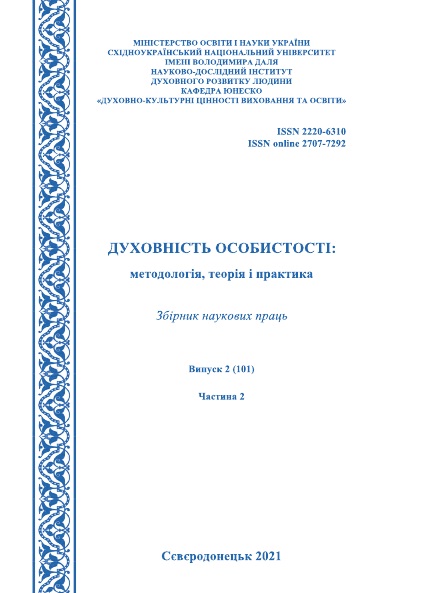ON THE ISSUE OF FORMATION OF CIVIL COMPETENCE IN STUDENTS BASED ON WORKS OF WRITERS OF THE DONETSK REGION WHEN TEACHING THE COURSE "WORKSHOP ON THE UKRAINIAN LANGUAGE"
DOI:
https://doi.org/10.33216/2220-6310-2021-101-2_2-49-58Keywords:
Civic competence, patriotism, literature of homeland, Ukrainian languageAbstract
The article continues the series of publications of the authors on the problem of formation of key competences in students in the process of their studying in institutions of higher education, in particular, when teaching humanities courses. Taking into account the fact that the reform of Ukrainian education aims at forming key competences in the learning process, the authors have explored the theoretical foundations of the concept of competence, the problems of formation of civic competence in applicants for higher education, have offered the illustrative material that can be used during practical classes when studying the spelling of the Ukrainian language, performing individual tasks, independent work of students. The issues of comprehensive development of applicants for higher education, in particular, the formation of civic competence (as one of the key competences) when studying the course "Workshop on the Ukrainian Language" based on the works of compatriot writers. In the work, the scientists give examples of the texts of Ukrainian prose. The presented material for practical application is offered as a result of the elaboration of the corresponding text of the work of the Ukrainian compatriot writer Ivan Kostyria "Thoughts about Donbas", the material can be used when teaching the course "Workshop on the Ukrainian language" in students of the philological faculty of the pedagogical university. The investigation reveals theoretical and practical aspects that enable the process of forming civic competence in students, which contributes to the education and upbringing of patriotic youth, erudite members of Ukrainian society, the future of the nation.
The illustrative material is valuable not only from the linguistic point of view but from the literary one because it helps to acquaint applicants for higher education with the figure of the writer born in Donetsk region, his creative work, and forms in students the example of a nationally conscious citizen of the country whose prose testifies love for our homeland. Accordingly, the material submitted in the investigation can become an element of integrated classes in the Ukrainian language and literature (literature of the native land).

